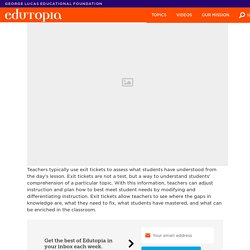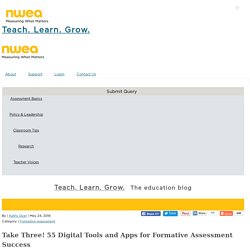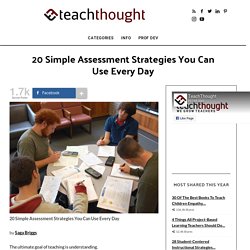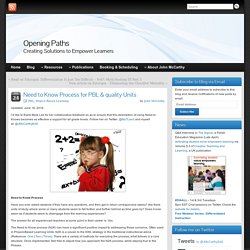

Exit Tickets: Checking for Understanding. Overview Exit Tickets: Checking for Understanding Exit tickets are a formative assessment tool that give teachers a way to assess how well students understand the material they are learning in class.

This tool can be used daily or weekly, depending on the unit being taught. A good exit ticket can tell whether students have a superficial or in-depth understanding of the material. Teachers can then use this data for adapting instruction to meet students' needs the very next day. How It's Done Teachers typically use exit tickets to assess what students have understood from the day's lesson. Designing An Exit Ticket Teachers design their own exit tickets. Exit tickets are only as good as how they are designed.
Technology offers an easy way to work with exit tickets, using Poll Everywhere or Google Forms. Spend some time designing an exit ticket the day before you teach. How Often and When? Compiling Data Using Data to Differentiate Instruction How did the group of students do overall? Resources. The Sheridan Center for Teaching and Learning. Project Based Learning Checklists. Checkboxes. Questions and Answers About Formative Assessment. Educational Leadership:Feedback for Learning:Seven Keys to Effective Feedback. MakingLearningVisibleResources - Ladder of Feedback. 10 Great Web Tools for Creating Digital Quizzes. June 20, 2016 Over the last couple of years, we have reviewed a wide variety of educational web tools to use to create digitally based quizzes.

Below is a collection of some of the most popular quizzing tools we have covered so far. Be it a flipped, blended, virtual or even traditional classroom, the tools below will enable you to easily create interactive quizzes, questionnaires and polls to share with students in class. Have a look and share with us your feedback. FlipQuiz is a web tool that allows teachers to easily create gameshow-style boards for test reviews in the classroom. All the boards you create can be saved for later use. 2- PurposeGames PurposeGames is a website for engaging learners through creating and playing games.As a teacher you can use PurposeGames to create a variety of game-based quizzes. 3- Riddle Riddle is an excellent web tool for teachers.
Take Three! 55 Digital Tools and Apps for Formative Assessment Success. There is no shortage of strategies, techniques, and tools available to teachers who use formative assessment in their classrooms.

It’s been over a year since we published our blog on digital tools and apps for formative assessment success and some of them we listed are no longer around. The good news is that there are new tools and apps that are available today that can help facilitate evidence of student learning. Here is an updated version of our list of digital tools and apps for formative assessment success. Share your tools, ideas, and thoughts with us so we can continue to keep this list growing and current.
Assessing 21st Century Skills. Rubrics. 2 SATC AssessTools PeerAssessment 042913. ISLES S Assessment Declarative Aug2014. Formative assessment - Google Slides. Edutopia 10 tips assessing project based learning. 20 Simple Assessment Strategies You Can Use Every Day. 20 Simple Assessment Strategies You Can Use Every Day by Saga Briggs The ultimate goal of teaching is understanding.

But sometimes it’s easier to talk than to teach, as we all know, especially when we need to cover a lot of material in a short amount of time. We hope students will understand, if not now then before test time, and we keep our fingers crossed that their results will indicate we’ve done our job. The problem is, we often rely on these tests to measure understanding and then we move on. Below are 22 simple assessment strategies and tips to help you become more frequent in your teaching, planning, and curriculum design. 22 Simple Assessment Strategies & Tips You Can Use Every Day 1.
Avoid yes/no questions and phrases like “Does this make sense?” 2. During the last five minutes of class ask students to reflect on the lesson and write down what they’ve learned. 3. Give a short quiz at the end of class to check for comprehension. 4. 5. 6. 7. 8. RubiStar Home. Educational Leadership:Feedback for Learning:Seven Keys to Effective Feedback. Need to Know Process for PBL & quality Units » Opening Paths. Updated: June 16, 2016 I’d like to thank Myla Lee for her collaborative feedback so as to ensure that this description of using Need to Knows becomes as effective a support for all grade levels.

Follow her on Twitter: and myself at: Need to Know Process Have you ever asked students if they have any questions, and then get in return unresponsive stares? Are there units of study where some or many students seem to fall further and further behind as time goes by? The answer for all experienced teachers at some point in their career is: Yes. The Need to Know process (N2K) can have a significant positive impact to addressing these concerns.
Overview The N2K process starts on the first day of a PBL or ALE unit (or traditional unit.) Phase One Starting the Need to Know process has the potential pitfall of no one asking questions. Use a Think-Pair-Share approach where participants generate an individual list of questions, then share with 1-3 others (Reference: One | Two | Three). Phase Two Display.